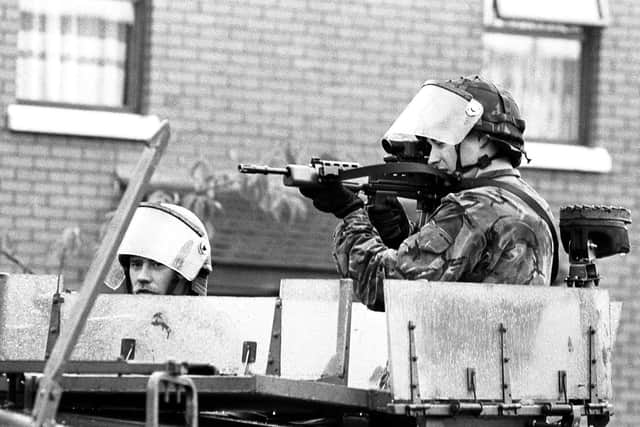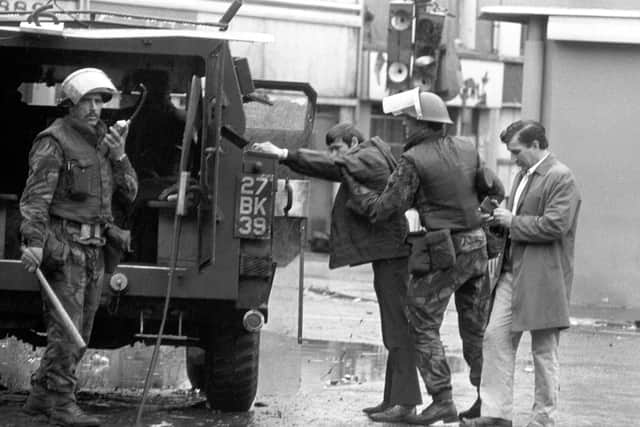Troops protection bill ‘could withstand legal challenge’: Joshua Rosenberg
and live on Freeview channel 276
Joshua Rosenberg has also commented on the prospect of the new Overseas Operations (Service Personnel and Veterans) Bill going through Westminster then being adapted to cover the Northern Ireland Troubles.
The stated aim of the current bill is to give veterans “greater certainty that the unique pressures placed on them during overseas operations will be taken into account when prosecutions decisions are made concerning alleged historical offences”.
Advertisement
Hide AdAdvertisement
Hide AdMr Rosenberg said: “The important thing about this bill is that, first of all, it doesn’t say anything about investigations, it deals only with prosecutions and, secondly, it doesn’t ban prosecutions but it has a presumption that it would be exceptional for a prosecution to be brought more than five years after an alleged offence.


“The speculation is that once this is passed by Parliament in London then ministers will say, ‘well, it’s unfair to exclude soldiers who served in Northern Ireland from this so we might as well cover them as well,’ and then there would be a presumption that if they hadn’t been prosecuted within say five years, then they couldn’t be prosecuted unless it is very exceptional. But that is all speculation.”
Mr Rosenberg told the BBC Talkback programme that such a course of action would be a legal time limit on bringing a prosecution... however, he also said the government could argue that the bill “creates a high bar” in terms of a prosecution threshold, and presumption against prosecutions, rather than preventing prosecutions.
“It would make it much harder to bring prosecutions in those circumstances, and the question then is whether that would simply apply to service personnel, the regular and reserve personnel, as this current bill does, or whether it should be extended more broadly to everybody that was involved in the Troubles in whatever way,” he said.
Advertisement
Hide AdAdvertisement
Hide AdAsked if bill covering service personnel only would inevitably face a challenge in the Supreme Court, Mr Rosenberg said: “If Parliament makes its position clear, then it’s difficult to see how it can be challenged. After all, it’s not creating new offences – it’s not making anything illegal now that was not illegal at the time. It is simply saying that in certain circumstances people wouldn’t be prosecuted.


“There would certainly be a great deal of concern whatever the government does, and I imagine that is why the government hasn’t actually been rushing into telling us what it is going to do, let alone putting it into effect.”
Commenting on whether such legislation would be compatible with international law, Mr Rosenberg said: “The problem is that the UK is signed up to the International Criminal Court (ICC), and the International Criminal Court brings prosecutions where states are unwilling or unable to bring prosecutions.
“And the whole point of the legislation which was passed when UK entered the International Criminal Court was to ensure that people charged with war crimes, and crimes against humanity, genocide, could be prosecuted within the UK.
Advertisement
Hide AdAdvertisement
Hide Ad“What this bill does, as a result of the amendments that were passed [on Wednesday], is to say that it will not apply to troops facing genocide, crimes against humanity or torture. People facing those charges may well be prosecuted despite this bill, even though the were five years earlier.”
Mr Rosenberg said that if the ICC believed anyone in the UK was escaping prosecution for war crimes, then the ICC prosecutor could step in and put them on trial in The Hague.
A message from the Editor:
Thank you for reading this story on our website. While I have your attention, I also have an important request to make of you.
Advertisement
Hide AdAdvertisement
Hide AdWith the coronavirus lockdown having a major impact on many of our advertisers — and consequently the revenue we receive — we are more reliant than ever on you taking out a digital subscription.
Subscribe to newsletter.co.uk and enjoy unlimited access to the best Northern Ireland and UK news and information online and on our app. With a digital subscription, you can read more than 5 articles, see fewer ads, enjoy faster load times, and get access to exclusive newsletters and content. Visit https://www.newsletter.co.uk/subscriptions now to sign up.
Our journalism costs money and we rely on advertising, print and digital revenues to help to support them. By supporting us, we are able to support you in providing trusted, fact-checked content for this website.
Alistair Bushe
Editor